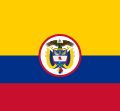War flag

A war ensign, also known as a military flag, battle flag, or standard,[1] is a variant of a national flag for use by a country's military forces when on land. The nautical equivalent is a naval ensign. Under the strictest sense of the term, few countries today currently have distinct war flags, most using a flag design that is also the state flag or general national flag for this purpose.
History
[edit]Sound trumpets! Let our bloody colours wave! And either victory, or else a grave.
— Edward, Prince of Wales, in Henry VI, Part 3, Act II, Scene II
Field signs were used in early warfare at least since the Bronze Age. The word standard itself is from an Old Frankish term for a field sign (not necessarily a flag).

The use of flags as field signs apparently emerges in Asia, during the Iron Age, possibly in either China or India.[2] in Achaemenid Persia, each army division had its own standard, and "all officers had banners over their tents".[3] Early field signs that include, but are not limited to a flag, are also called vexilloid or "flag-like", for example the Roman Eagle standard or the dragon standard of the Sarmatians. The Roman Vexillum itself is also "flag-like" in the sense that it was suspended from a horizontal crossbar as opposed to a simple flagpole.
Use of simple flags as military ensigns becomes common during the medieval period, developing in parallel with heraldry as a complement to the heraldic device shown on shields. The maritime flag also develops in the medieval period. The medieval Japanese Sashimono carried by foot-soldiers are a parallel development.
Some medieval free cities or communes did not have coats of arms, and used war flags that were not derived from a coat of arms. Thus, the city of Lucerne used a blue-white flag as a field sign from the mid 13th century, without deriving it from a heraldic shield design.
Current war flags
[edit]Used by armed forces only
[edit]-
Canadian Armed Forces ensign
-
War flag of the Republic of China Armed Forces
-
Flag of the Iranian Army
-
War flag of the Korean People's Army of North Korea
Army (land) use only
[edit]-
British Army non-ceremonial flag
-
War flag (regimental color) of the Hellenic Army
War flags that are also naval ensigns
[edit]Former war flags
[edit]-
Flag of Bangladesh during Bangladesh Liberation War
-
The original Eureka Flag specimen, rebel warflag at the 1854 Battle of Eureka Stockade
-
Battle flag of the Confederate States (1861–1865)
-
Cross of Burgundy Flag, Spain (1506–1843)
-
War flag of the Imperial Japanese Army (1868–1945)
-
War flag of the People's Republic of Congo (1970–1991)
-
The "Gadsden flag", used by some Continental forces during the American Revolutionary War (1775–1783)
-
Battle flag of the United Irishmen, used at the Battle of Arklow
-
War flag of East Germany (1960–1990)
-
War flag of the Chetniks (1903–1946)
-
War flag and ensign of Iran (1925–1979), between 1910 and 1925 the Kiani Crown was used instead of Pahlavi Crown
-
War flag of the Italian Social Republic (1943–1945)
-
War flag of the Ottoman Empire (1912)
-
War flag of Prussia (1816)
-
War flag of the German Empire (1903–1919)
-
War flag of the Roman Republic of 1849
-
Flag of the Red Army and Soviet Armed Forces (Unofficial)
-
Royal Siamese Army in Haw wars (1885–1890)
-
United States Cavalry guidon.
-
War flag of the Royal Italian Army
-
War ensign of the Slovak Republic (client state of Nazi Germany 1939–1945)
-
-
War flag of the Royal Hungarian Army (1939–1945)
-
War flag of Zaire
See also
[edit]References
[edit]- ^ "standard". Oxford English Dictionary (Online ed.). Oxford University Press. (Subscription or participating institution membership required.)
- ^ flag. (2008). Encyclopædia Britannica. Chicago: Encyclopædia Britannica.
- ^ E. Pottier, Douris, London, 1909, p. 105 fig. 20, Plate XXV.b
- ^ "India before British Rule". www.crwflags.com. Archived from the original on 2021-01-16. Retrieved 2021-01-10.
Further reading
[edit]- Wise, Terence (1978) Military flags of the world, in color. New York: Arco Publishing. 184p. ISBN 0668044721. War flags of 1618–1900.










































































![War flag of Mughals (1526–1857)[4]](http://upload.wikimedia.org/wikipedia/commons/thumb/0/03/Mughals_war_Flag.gif/120px-Mughals_war_Flag.gif)











